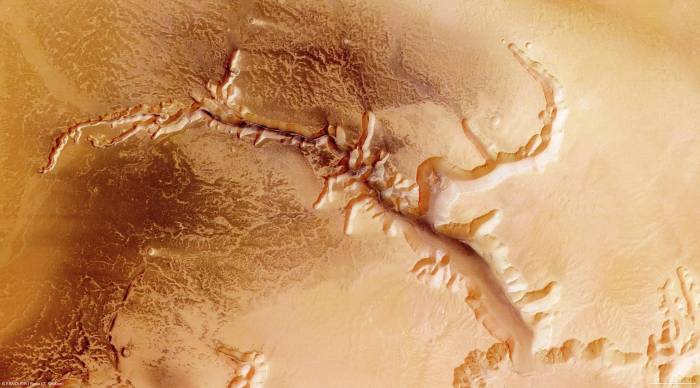The discovery marks the first time a stable body of water has been detected on Mars, resolving a decades long debate about whether it has any water at all. It has long been assumed that if water was not present on the red planet, it would almost certainly not be capable of sustaining life.
However, according to scientists responsible for the breakthrough, the vast lake lies underneath Mars’s southern pole and stretches 20km across.
“If these researchers are right, this is the first time we’ve found evidence of a large water body on Mars,” said Cassie Stuurman, a geophysicist at the University of Texas who found signs of an enormous Martian ice deposit in 2016.
Mars long ago was warmer and wetter, possessing significant bodies of water, as evidenced by dry lake beds and river valleys on its surface. There had been some signs of liquid water currently on Mars, including disputed evidence of water activity on Martian slopes, but not stable bodies of water.
The discovery was found by scientists using the Mars Advanced Radar for Subsurface and Ionosphere Sounding (Marsis) instrument on the Mars Express spacecraft. That instruments sends out radar pulses that penetrate the surface and ice caps on Mars, and measures the radio waves when they come back to the spacecraft.
Scientists led by Roberto Orosei examined that data between May 2012 and December 2015 and found that there was a very sharp change in the radar signals, when looking at the area, which was found 1.5km beneath the surface.
The researchers spent two years ensuring that the data wasn’t the result of some other effect – eventually ruling out every possible explanation apart from liquid water of some kind.
“It’s tempting to think that this is the first candidate place where life could persist on Mars,” said Orosei.
The data is similar to that seen when radars look at the lakes of liquid water found beneath the Antarctic and Greenland ice sheets on Earth. Scientists have suggested that microbial life could live in those extreme conditions – as it might on Mars.
“This kind of environment is not exactly your ideal vacation, or a place where fish would swim,” Orosei added. “But there are terrestrial organisms that can survive and thrive, in fact, in similar environments. There are microorganisms on Earth that are capable of surviving even in ice.”
Scott Hubbard, a professor of astronautics at Stanford University who served as Nasa’s first Mars program director in 2000, called it “tremendously exciting”.
“Our mantra back then was ‘follow the water’. That was the one phrase that captured everything,” Hubbard said. “So this discovery, if it stands, is just thrilling because it’s the culmination of that philosophy.”
It is even colder on Mars than it is in the Antarctic and Greenland, making the discovery of liquid water even more surprising.
The water itself is likely to be a briny sludge. The salt that makes that brine is also probably the reason there is liquid water at all, since it helps melt the otherwise icy water in the same way grit is used to remove snow from streets.
“This is a stunning result that suggests water on Mars is not a temporary trickle like previous discoveries but a persistent body of water that provides the conditions for life for extended periods of time,” said Alan Duffy, an astronomer from Swinburne University and the lead scientist of Australia’s Science Channel.
There is nothing particularly special about the area where the water was found – it is simply the region on Mars where the radar that made the detection is most sensitive. That means that there could be similar deposits under the ground all the way across Mars.
It remains to be seen if more subsurface reservoirs of water will be found or whether the newly discovered one is some sort of quirk, Orosei said.
If others are detected and a network of subglacial lakes exists like on Earth, he said, that could indicate liquid water has persisted for millions of years or even dating back to 3.5 billion years ago when Mars was a more hospitable planet.
The Independent
More about: Mars
















































